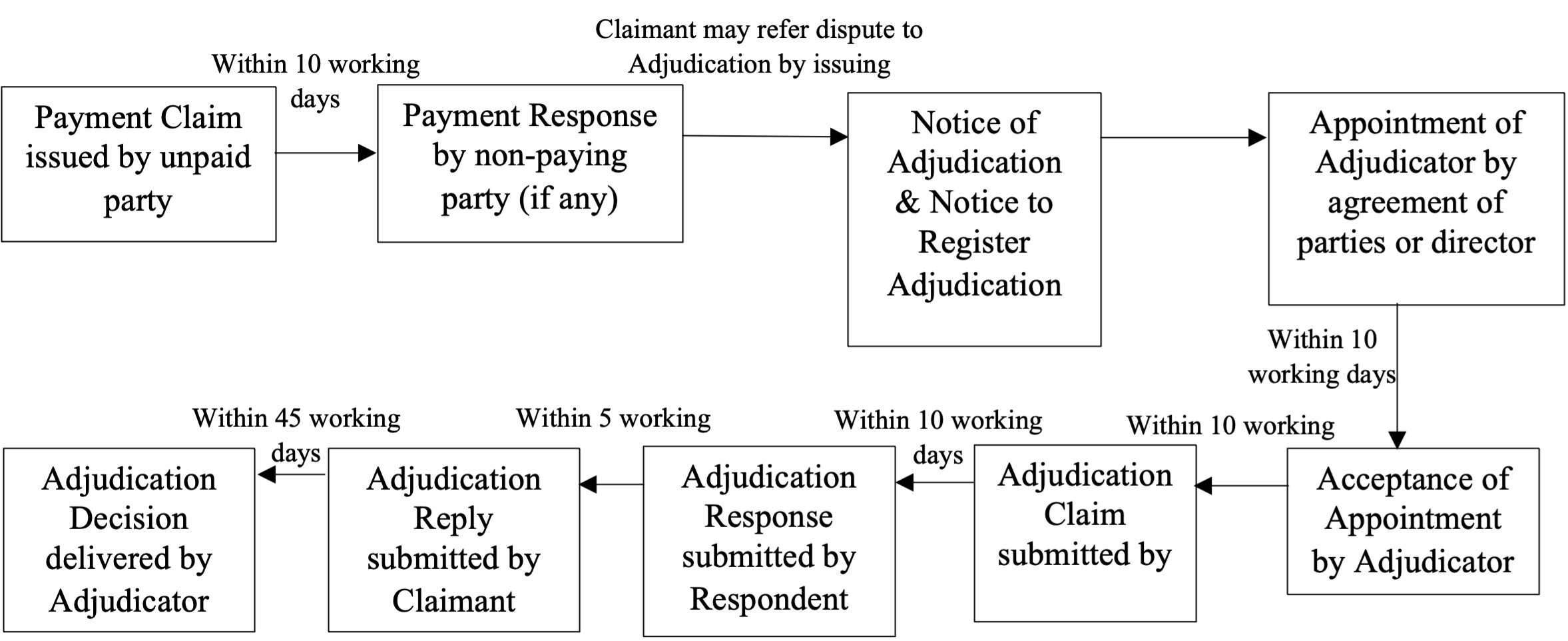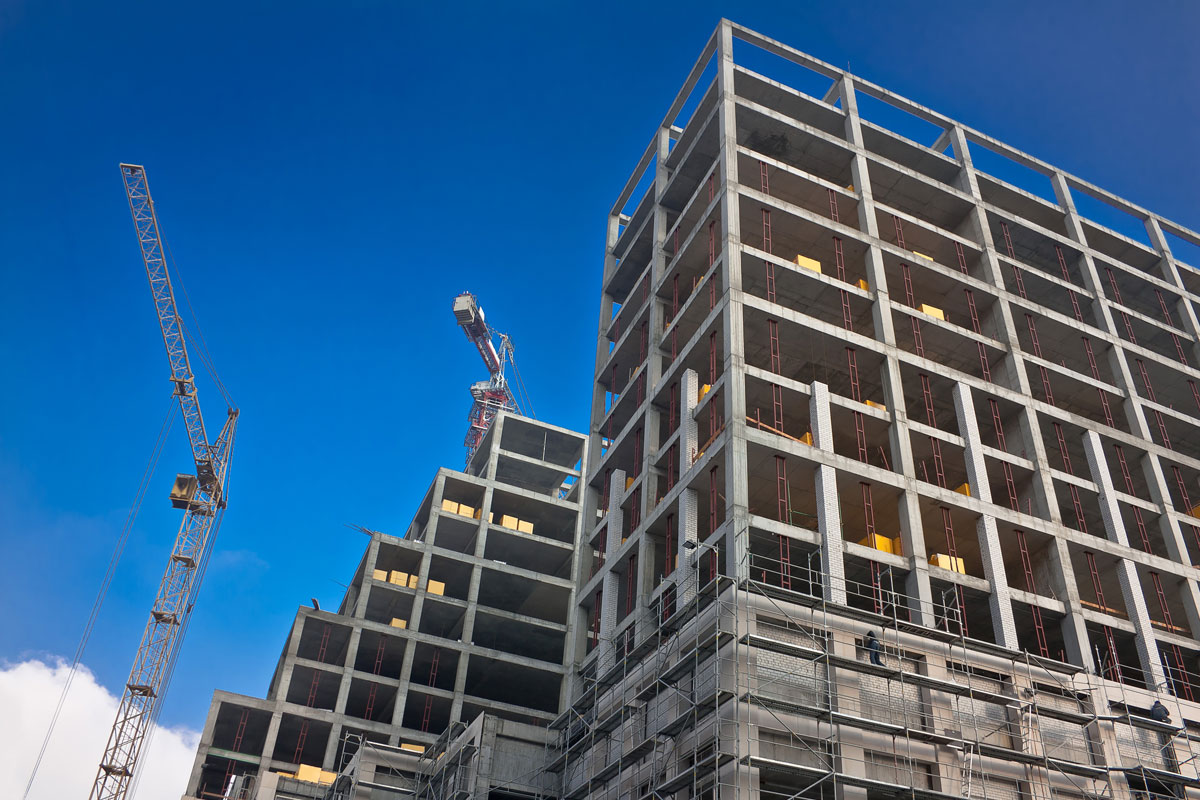Introduction
The most common problem faced by contractors in the construction industry are non-payment by employer. As Mary Lim J. (now FCJ) once said, cashflow is the lifeblood of the construction industry[1]. Without receiving payment in due time, contractor faces cashflow issue and this may impact payment down the chain of contract to sub-contractors and suppliers. The situation is not helped with the lengthy and expensive process to recover non-payment by way of Court and Arbitration[2]. As a result, an unpaid contractor with weak financial capacity are often forced to settle for an amount which is only a fraction of the amount due to them.
It is for this very reason, the statutory Adjudication under the Construction Industry Payment and Adjudication Act 2012 (“CIPAA”) was introduced to tackled some of these issues faced by the contractor. In brief, CIPAA aims to offer a quicker dispute resolution mechanism (only approximately 100 working days) at affordable costs, providing cash flow to contractor while the Project is ongoing.
What is CIPAA?
CIPAA is essentially a new forum of dispute resolution. CIPAA came into force on 15th April 2014 and applies to all construction contract in writing entered into after 15th April 2014[3]. CIPAA is meant to be a summary process for resolving payment disputes at any stage of a construction contract, without waiting for the final resolution through Court or arbitration. Some of the features of CIPAA are:
- Decision Under CIPAA Is Made By An AdjudicatorDispute in CIPAA is to be decided by an independent third-party known as the Adjudicator who is to be appointed by the agreement of parties. This gives parties the flexibility to choose Adjudicator with the appropriate skills and experience that are relevant to the nature of the dispute.
For example, in the event that the parties foresee that the issue of extension of time will be highly contentious, it may be advisable for parties to appoint an Adjudicator with expertise in delay-analysis etc.
Failing any agreement by the parties, either party can request that the Adjudicator be appointed by the Director of the Asian International Arbitration Centre (“AIAC”)[4].
- CIPAA Applies to Payment DisputeCIPAA allows a party in a construction contract to refer disputes relating to payment for work done and/or services rendered Adjudication under the Act. Claims for damages arising out a breach of a contract and loss and expenses are unfortunately not allowed to be referred to adjudication under CIPAA.
- CIPAA Proceeding Takes Approximately 100 Working DaysCIPAA procedure takes approximately 100 working days and can be summarize as follows:

- CIPAA Proceeding Are Mostly Document Based
Whilst an Adjudicator has the power under CIPAA to direct for oral hearing[1], Adjudication proceedings under CIPAA are more often time than not disposed of solely by way of exchange of documents without the need for oral hearing. This is also in line with the objective of CIPAA being a cheaper and quicker dispute resolution mechanism.
Why CIPAA?
Whilst CIPAA is an alternative to Court and Adjudication, one may wonder what makes CIPAA stands out from the latte two. Below are some of the advantages offered by CIPAA:
- CIPAA Is QuickerAdjudication under CIPAA takes only approximately about 100 working days to conclude from the date of initiating claim until the date an Adjudication Decision is delivered. Comparatively, an arbitration and court proceeding may take up 1 to 2 years.
- CIPAA Is CheaperAs Adjudication proceedings under CIPAA are often time conducted purely on exchange of documents, the costs are usually lower as compared to Court and Arbitration. In fact, under CIPAA, there is no requirement for parties to be represented which further reduces any legal representation costs.
Pursuant to Section 18(1) of CIPAA, costs shall follow event which mean that the losing party is bound to pay the costs of the winning party. In other words, if the contractor can prove that there is outstanding payment due by the employer, the employer will also be ordered to pay the costs incurred by the contractor in the CIPAA proceeding (including any legal representation costs should the contract chooses to appoint one).
- Contractor’s Right Under Adjudication Decision Is Far ReachingPursuant to Section 13 of CIPAA, an Adjudication Decision delivered is binding on parties unless (1) it is set aside by the High Court (Section 15 of CIPAA 2012), (2) the subject matter of dispute is settled by written agreement between parties or (3) the dispute is resolved by way of arbitration or court proceeding.
Further, a winning party also enjoys the following rights under CIPAA:
- The winning may apply to enforce the adjudication decision as an order or judgment of the High Court[1]. Once the adjudication decision is registered as a High Court order or judgment, the winning party may execute the order or judgment as per the usual execution proceeding (i.e. garnishee, winding up etc).
- The winning party may suspend or reduce rate of works in the event that the amount awarded under the Adjudication Decision is not paid[2]. If a contractor chooses to exercise this right, CIPAA expressly provide that the contractor is (1) not in breach of contract, (2) entitled to a fair and reasonable extension of time, and (3) entitled to recover loss and expense incurred as a result of the suspension / reduction in rate of works[3].
- CIPAA allows the winning party to seek direct payment form the principal of the losing party[4]. For instance, in the event that a sub-contractor obtained an adjudication decision in its favour against the contractor and the contractor has failed to comply with the decision, the sub-contractor has a right to seek direct payment form the employer (being the principal to the contractor). The employer in such a situation is bound to pay the sub-contractor if there is amount due and owing by the employer to the contractor.
- CIPAA’s Scope Is WideCIPAA applies to a wide range of construction contracts. So long as the construction contract is in writing and involves the following works, CIPAA will apply:
- Contract to provide consultancy work (i.e. architectural, engineering, surveying, exterior and interior decoration, landscaping and project management services).
- Contract to construct, extend, install, repair, maintain, renew, remove, renovate, alter, dismantle, or demolish:
- any building, erection, edifice, structure, wall, fence or chimney, whether constructed wholly or partly above or below ground level;
- any road, harbour works, railway, cableway, canal or aerodrome;
- any drainage, irrigation or river control work;
- any electrical, mechanical, water, gas, oil, petrochemical or telecommunication work; or
- any bridge, viaduct, dam, reservoir, earthworks, pipeline, sewer, aqueduct, culvert, drive, shaft, tunnel or reclamation work,”
- Contract to carry out works which forms an integral part of, or are preparatory to or temporary for the works described in paragraph (d)(ii) above, including site clearance, soil investigation and improvement, earth-moving, excavation, laying of foundation, site restoration and landscaping; and
- Contract for the procurement of construction materials, equipment or workers, as necessarily required for any works paragraph (d)(ii) above.
- Conditional Payment Clauses Are Prohibited Under CIPAAWhilst it is common for employer to insert conditional payment clauses (i.e. pay-when-paid or pay-if-paid) in the contract to make payment conditional upon occurrence of certain event, such provision will no upheld under CIPAA. Section 35 of CIPAA expressly states that “Any conditional payment provision in a construction contract in relation to payment under the construction contract is void.” In other words, even if there is a pre-condition before a contractor is entitled to payment, such pre-condition will not apply to CIPAA proceeding and the contractor is still entitled to be paid.
Conclusion
All in all, CIPAA is definitely a welcomed legislation and has no doubt helped many contractors with their cash flow problem. However, with the focus of CIPAA being quick and documents based, it is all the more important that parties in the construction industry maintain a proper record keeping of their documents in anticipation of dispute. Further, in view of the far reaching consequences of an Adjudication Decision, parties should also appoint appropriate representation to assist in the conduct of the Adjudication proceedings.
If you have any question on this topic please feel free to contact the author Leong Chee Weng @ cheeweng@lpplaw.asia
[1] Uda Holdings Bhd v Bisraya Construction Sdn Bhd & Anor And Another Case [2015] 5 CLJ 527
[2] Some arbitration clause even stipulates that arbitration could only be commenced upon the completion of the Works or termination of the contractor’s employment which only further inhibits contractor’s right to recover non-payment.
[3] Section 25(g) CIPAA
[4] Section 28 of CIPAA
[5] Section 29 of CIPAA
[6] Section 29(4) of CIPAA
[7] Section 30 of CIPAA
[8] Jack-In Pile (M) Sdn Bhd v Bauer (Malaysia) Sdn Bhd [2020] 1 CLJ 299
[9] Section 21(b)(i) of CIPAA

